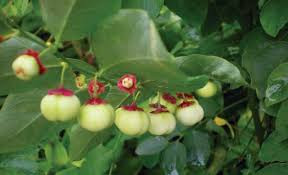Malabar spinach - A medicinal herb that increases resistance
Sweet potato is one of the rare plants that contain vitamin K. According to the American College of Clinical Nutrition, eating vegetables with natural vitamin K reduces the risk of bone fractures in the elderly.
Malabar spinach, in folklore, is called by many names: Bồ ngot, bù ngot, and Bồ ngon, bong ngot (because it is sweet). The Chinese name is Hắc hiện thần (some books record its effectiveness as a god). The book Bản thảo calls rau ngot "dong phong đại". Because when the east wind comes, this vegetable sprouts and grows. Scientific name: Sauropus androgynus. (L) Meer. To make medicine, use plants 2 years old or older.
According to Oriental medicine, Malabar spinach is cool (it will be less cold when cooked) and sweet. It has the ability to clear heat, detoxify, diuretic, increase salivation, promote blood circulation, nourish blood, stop bleeding, laxative, antiseptic, anti-inflammatory, and regenerate tissue.
 |
Malabar spinach is nutritious for diabetics.
Malabar spinach is a medicine that is both "tonifying and beneficial" and "supports the body's vital energy and expels evil energy", increasing the body's resistance and fighting against external causes of disease that infiltrate the body.
Malabar spinach is used to treat the following diseases:
Newborn baby has thrush, white blistered tongue, refuses to breastfeed:Apply fresh spinach juice on the damaged tongue. Can be mixed with honey.
Retained placenta after birth, abortion: give the mother a bowl of fresh spinach juice
Postpartum care:Malabar spinach soup is cooked with lean pork or minced pork. Some places often cook Malabar spinach soup with shrimp eggs, fish eggs, perch, snakehead fish... but lean pork is more safe for the health of breastfeeding mothers.
Summer heat-relieving soup:Malabar spinach soup with mussels is cool, sweet and rich. This combination is cold so add a slice of ginger or avoid it for people with cold conditions.
Cure bone pain (pain in the bones, not joint pain and swelling):Cook Malabar spinach with pork bones (don't use pork ribs as the ancients said, maybe you need marrow...).
Children with yin deficiency sweat at night and are always hot.: 30g Malabar spinach, 30g ground squash, cook with pig testicles.
Swollen and painful feet: Crush Malabar spinach leaves with salt water and apply.
Persistent shin (lower leg) sores:2 parts Malabar spinach, 1 part lime, crushed and applied once a day.
Nosebleeds:Pound Malabar spinach, add water and a little sugar to drink, wrap the pulp in cloth and place on the nose.
Detoxify alcohol, alcohol with pesticides, alcohol soaked with Strychnos nux vomica, seafood allergy: Drink raw Malabar spinach juice.
According to some studies on the chemical composition of Malabar spinach:
In 100g of vegetables, there are 6.5g of protein, 0.08g of fat, 9g of sugar, 503mg of potassium, 15.7mg of iron, 13.5mg of manganese, 0.45mg of copper, 23,300IU of beta-carotene, 85mg of vitamin C, 0.033mg of B1, 0.88mg of B2. This shows that Malabar spinach (compared to other leafy vegetables) has a lot of protein, iron, manganese and provitamin A.
Malabar spinach is also rich in magnesium, copper, potassium, vitamin C and PP. Regarding amino acids, 100g of Malabar spinach contains 0.34g threonine, 0.25g phenylalanine, 0.24g leucine, 0.23g isoleucine, 0.16g lysine, 0.13g methionine, 0.05g tryptophan.
With such high quality vegetable protein, Malabar spinach is recommended to replace animal protein to limit calcium metabolism disorders that cause osteoporosis and kidney stones. Malabar spinach is recommended for people who want to lose weight and people with high blood sugar.
In addition, Malabar spinach is one of the rare plants that contain vitamin K. According to the American of clinical nutrition 1/1999 and the document of Berkeley University 7/1999, eating vegetables with natural vitamin K reduces the risk of bone fractures in the elderly, because it protects the cartilage structure against erosion...
Since 1973, Pareira and Ifafar discovered that in Malabar spinach there is a lot of papaverine, a substance previously only found in opium. In treatment, papaverine is used to relax the smooth muscles of blood vessels, reduce visceral pain, lower blood pressure and cause penile erection.
Every 100g of Malabar spinach has 580mg of papaverine, so if you eat too much Malabar spinach in a meal, you may theoretically experience side effects caused by papaverine (drowsiness, dizziness, constipation...).
According to Health and Life






